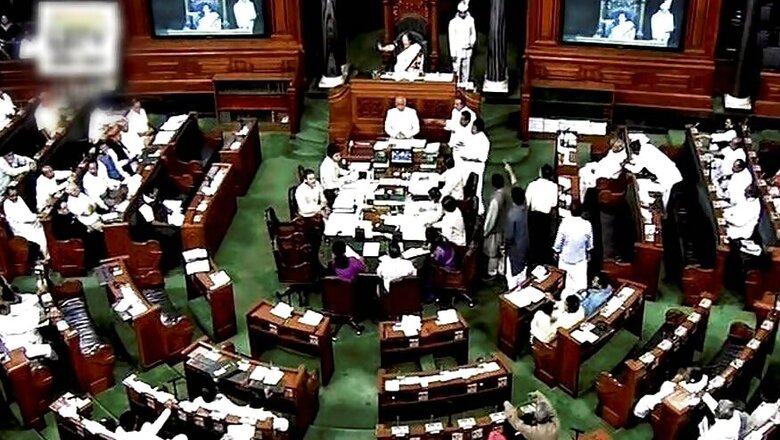
views
With the Parliament open for business for the Monsoon Session, there are several important pieces of legislation that need to be passed.
Here is everything you need to know about parliamentary procedure and practices:
- Adjournment Motion: is the procedure for adjournment of the business of the House for the purpose of discussing a definite matter of urgent public importance, which can be moved with the consent of the Speaker. The Adjournment Motion, if admitted, leads to setting aside of the normal business of the House for discussing the matter mentioned in the motion.
To be in order, an adjournment motion must raise a matter of sufficient public importance to warrant interruption of normal business of the House and the question of public importance is decided on merit in each individual case.
The purpose of an Adjournment Motion is to take the Government to task for a recent act of omission or commission having serious consequences.
Its adoption is regarded as a sort of censure of the Government.
- Question Hour The first hour of Parliament is known as 'Question Hour'. During this time, members can ask questions of the government and its ministers.
- Starred Question: There are three types of questions a member may ask - Starred, Unstarred and Short Notice. A starred question is asked orally by an MP to a minister. It has to be submitted 15 days in advance and each MP can only ask one starred question per day. A total of 20 such questions are permitted for one day.
- Unstarred Question: An Unstarred Question is one which receives a written reply from a ministry. An MP has to submit an unstarred question 15 days in advance. A total of 230 unstarred questions are permitted per day.
- Short Notice Questions: A Short Notice Question pertains to a matter of grave public importance and can be asked with less than ten days' notice. It is asked orally in Parliament and is used very rarely.
- Zero Hour: The hour in Parliament immediately after Question Hour is known as 'Zero Hour'. It is used to raise urgent matters that cannot wait for other procedures. An MP can raise an issue during Zero Hour by giving notice before 10 am on the day of the sitting.
- Laying before the House/Laying on the table of the House: A document is said to be 'laid before the House' or 'laid on the table of the House' when it is made available for all members to read. This includes reports by a ministry, government bodies, audit reports etc.
- Calling Attention: Calling Attention is a tool by which an MP can call the attention of a minister to an important matter. The minister then has to issue a statement, following which questions can be asked.
- Half-an-hour discussion: If an MP feels the answer to a starred or unstarred question requires further explanation, he or she can ask for Half-an-hour discussion on the answer given by the ministry. A notice of three days is required.
- Motion to Adjourn: An Adjournment motion is used to suspend the proceedings of the house temporarily to meet at another time.
- Adjourning Sine Die: When the House has not determined when it will reconvene, it is adjourned Sine Die or indefinitely.
- No Confidence Motion: A No Confidence Motion, also known as a Trust Vote or Floor Test, can be moved by an MP against the Council of ministers if he or she feels the government of the day has lost the confidence of the house. If 50 or more members second the motion, the House will debate it, after which it is put to vote.
- Bill: A Bill is a proposed piece of legislation. A Bill becomes a law when it is passed by Parliament.
- Government Bill: A Bill introduced by a minister is known as a Government Bill.
- Private Member Bill: A Bill introduced by a Member of Parliament, who is not a minister, is known as a Private Member Bill.
- Ordinary Bill: A Bill that pertains to any topic under the Union or Concurrent Lists. It can be introduced in either house. It requires a simple majority in each house to pass.
- Money Bill: A Bill involving taxation, borrowing, government funding, payment or withdrawal of money from the Consolidated or Contingency Funds of India. It can only be introduced in the Lok Sabha and requires a simple majority in Lok Sabha. Rajya Sabha can recommend changes but Lok Sabha has the right to reject those changes. Rajya Sabha must return or pass a Money Bill in 14 days. If it doesn't do so, it is deemed passed.
- Introduction of a Bill: A Bill can be introduced in the House by giving seven days' notice.
- Parliamentary Committees: Parliamentary committees are groups of MPs whose job is to review proposed laws and scrutinise the finances of the government. There are two types of Parliamentary committees - Standing Committees and AdHoc Committees.
- Standing Committee: A Standing Committee is a permanent and regular Parliamentary Committee.
- AdHoc Committee: An AdHoc Committee is convened for a specific purpose and it ceases to exist once that task is complete.
- Quorum: The minimum number of members required to be present before a session can begin is known as Quorum. In the Indian Parliament, session cannot begin unless one-tenth of the members are present. The necessary number to achieve quorum is 55 MPs in Lok Sabha and 25 in Rajya Sabha.


















Comments
0 comment